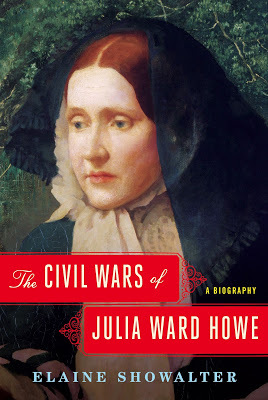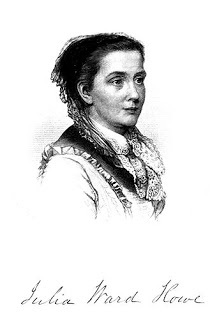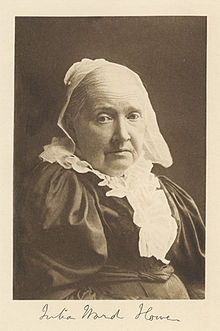Julia Ward Howe
 The first full biography of Julia Ward Howe—the author of The Battle Hymn of the Republic and an early and powerful feminist pioneer—a groundbreaking figure in the abolitionist and suffrage movements.
The first full biography of Julia Ward Howe—the author of The Battle Hymn of the Republic and an early and powerful feminist pioneer—a groundbreaking figure in the abolitionist and suffrage movements.Julia Ward (1819–1910) was a heiress and aspiring poet when she married Dr. Samuel Gridley Howe, an internationally-acclaimed pioneer in the education of the blind. Together the Howes knew many of the key figures of their era, from Charles Dickens to John Brown. But he also wasted her inheritance, isolated and discouraged her, and opposed her literary ambitions. Julia persisted, and continued to publish poems and plays while raising six children.
Authorship of the Battle Hymn of the Republic made her celebrated and revered. But Julia was also continuing to fight a civil war at home; she became a pacifist, suffragist, and world traveler. She came into her own as a tireless campaigner for women’s rights and social reform. Esteemed author Elaine Showalter tells the story of Howe’s determined self-creation and brings to life the society she inhabited and the obstacles she overcame.
 In November 1861, while she was staying at Willard’s Hotel in embattled Washington, DC, Julia Ward Howe wrote the lyrics to the most famous patriotic anthem of the Civil War. “It would be impossible for me to say,” she wrote in her Reminiscences (1899), “how many times I have been called upon to rehearse the circumstances under which I wrote the ‘Battle Hymn of the Republic.’ ”
In November 1861, while she was staying at Willard’s Hotel in embattled Washington, DC, Julia Ward Howe wrote the lyrics to the most famous patriotic anthem of the Civil War. “It would be impossible for me to say,” she wrote in her Reminiscences (1899), “how many times I have been called upon to rehearse the circumstances under which I wrote the ‘Battle Hymn of the Republic.’ ” Indeed, until she died in 1910 at the age of ninety-one, Howe endlessly told and retold the story of how she had come to write the lines that made her famous. Everywhere she traveled or spoke—at a school in St. Paul, a Unitarian church in Chicago, a gathering of black women in New Orleans, or a flower-bedecked Memorial Day celebration in San Francisco—she was expected to read the words of the song, or sing them in her trained contralto; and choruses and soloists around the world enthusiastically honored her by performing it as well. This “oft-told tale,” she noted, had become for many Americans the story of her life.
A century ago, the first biography of Howe, written by three of her daughters, and published in March 1916, just six years after her death, won the Pulitzer Prize. Awarded for the first time in 1917, in the midst of another war, the Pulitzer Prize had a strong moral and nationalistic purpose. Nicholas Butler, the president of Columbia University and the administrator of the awards, called Julia Ward Howe the “best American biography teaching patriotic and unselfish services to the people, illustrated by an eminent example.”
Despite this sanctimonious encomium, the two-volume biography was not as didactic as Butler’s tribute makes it sound. The daughters drew on the Howe family correspondence, plus Julia’s essays, poems, memoir, and journals, to tell a lively story of a woman as charming and funny as she was learned and thoughtful, as devoted to her large family as to public service. Howe was certainly eminent, unselfish, and patriotic. She had six children, learned six languages, published six books; she was a prominent figure in the churches and intellectual societies of Boston; she joined ardently with her husband in the abolitionist struggle; she traveled all over the United States, the Caribbean, and Cuba, and abroad to England, France, Italy, Switzerland, Germany, Holland, Belgium, Greece, Cyprus, Palestine, and Egypt; she founded and led the Association of American Women, served as president for the New England Woman’s Club, the New England Suffrage Association, and the American Woman’s Suffrage Association. Howe was the first woman to be inducted into the American Academy of Arts and Letters.
Born three days after Queen Victoria, she was sometimes called the Queen of America. The daughters also wrote an inspiring story of their parents’ marriage. When she married Dr. Samuel Gridley Howe, Julia Ward was an aspiring poet, a beautiful, accomplished, studious heiress known in New York social circles as “the Diva.” Samuel G. Howe, eighteen years her senior, was a hero of the Greek Revolution of the 1820s and a world- famous doctor who had developed a method for educating blind children; his name, the critic John Jay Chapman noted, “was known to everyone in the civilized world.” Together the Howes were one of the leading power couples of nineteenth-century America, uniting exceptional intelligence, moral fervor, worldly ambition, immense energy, and public commitment. Living in Boston, they knew many of the key literary, political, intellectual, and scientific figures in the Civil War era, including Charles Sumner, Henry Wadsworth Longfellow, Margaret Fuller, and John Brown. They traveled to Europe on steamers as often as modern jet-setters would amass frequent-flyer miles and made friends there as well; Florence Nightingale was the godmother of one of their daughters; Dickens, their guide in London. They were devoted and imaginative parents, and their marriage, in the title of another memoir by their daughter Laura E. Richards, was the fusion of “two noble lives.” But that first biography hid as much as it revealed. In reality, the marriage was turbulent and unstable—a prolonged domestic battle over sex, money, independence, politics, and power. The Howes disagreed, quarreled, separated, often lived and worked apart. Despite his inexhaustible compassion for the suffering, helpless, and deprived, and regardless of his dedication to the abolition of slavery, Howe held obstinate and conservative views on women’s roles in public life. He expected his wife to be completely fulfilled in her domestic and maternal role, and to accept with gratitude his right to make all the decisions about their lives together. A towering figure in the field of philanthropy and social reform, at home he was dictatorial, restless, and touchy about his own authority, “an ordinary man,” as Chapman wrote, “a man of headaches and irritability, a man of doubts and errors.”6 Julia Ward expected to have a partner who would introduce her to his more consequential world of ideas and social reform, and allow her to act in it. She assumed that she would be an equal partner in their decisions and free to develop and pursue her own literary aspirations. She hoped to “write the novel or play of the age.”7 Her husband, however, tried to stop her writing after she published an anonymous book of confessional poems that enraged and humiliated him. He took control of her large fortune, and lost most of it. Throughout most of their marriage, famous and beloved though Julia became, his expectations dominated hers. She had to exercise her power obliquely with the soft feminine weapons of tears, self-sacrifice, unselfishness, domesticity, and maternity. For personal self-expression and public communication, she had to use the conventional medium of lyric poetry, and then even that was eventually denied to her. Nevertheless, in the course of their marriage, she learned how to resist his dictatorship, respect her own needs, and develop, defend, and act upon her convictions—in sum, how to think about the manifold ways that the politics of inequality entered the household. Writing the “Battle Hymn” was the turning point in her life, and its renown gave her the power and the incentive to emancipate herself. The Civil War challenged nineteenth-century ideals of separate spheres for men and women, changed assumptions about gender, and propelled women out of domestic confinement into public lives and careers. In Howe’s case, this transformation was also a rebellion against her marriage. She fought a second civil war at home, battling with her husband over her rights to independence, equality, and a public voice.
After her husband’s death in 1876, Julia was free to forge a new identity. For the second half of her life, she was a leader of the fight for women’s suffrage. She traveled alone or with other suffragists all over the United States campaigning for women’s rights. She became an advocate for the emancipation of the silenced and subjected. Although her children, and then her grandchildren, continued to complain about her extra-domestic activities and attempt to thwart them, Julia insisted on doing what she believed necessary and right. The glorious final decades of her life were a result of the limitations of her marriage and a refutation of its confining bonds. There have been a few excellent biographies since 1916, but there is none that looks at Julia Ward Howe as a major American heroine and sees the marriage of the Howes as a paradigmatic clash of nineteenth- century male and female ambitions. The Civil Wars of Julia Ward Howe tells the story of her battle in that other civil war of emancipation.
“Elaine Showalter is that rarity: a scholar, feminist historian, sharp-eyed cultural critic, with a knack for choosing subjects that are both entertaining and brilliantly illuminating. The Civil Wars of Julia Ward Howe is written with Showalter's usual witty, sparkling, and erudite style. This zestfully narrated life of an early, pioneering feminist, a tireless crusader for social reform and women's rights, would make an ideal PBS series—indeed, all the parts are in place for a felicitous adaptation of Showalter's gem of a biography of a truly remarkable American woman.”—Joyce Carol Oates
“Famous as the author of Battle Hymn of the Republic, Julia Ward Howe had a memorable career beyond this single momentous achievement, as a poet, abolitionist, mother, lecturer, and feminist. Interweaving her public life with Julia's troubled marriage to the domineering Samuel Gridley Howe, this splendid biography shows how Julia emerged from her private tribulations as a stronger and more complete person.”—James McPherson, author of The War that Forged a Nation: Why the Civil War Still Matters
“In this gracefully presented biography of the woman we remember as the author of the nation’s signature hymn, we find ourselves fighting along with Julia Ward Howe as she wages her long struggle for independence as a 19th Century daughter, wife and mother. Only occasionally did she call retreat as she used the reach of the Battle Hymn and the responsibilities assigned to women during the Civil War to wage her own fight for freedom for herself and the women of America.”—Cokie Roberts, author of Capital Dames, The Civil War and the Women of Washington
“Glory! Glory! Hallelujah! At last a full, fine, modern biography of the independent woman whose words reanimated the American Civil War and crowned Lincoln, its greatest hero, with a worthy anthem.”—Harold Holzer, author of Lincoln and the Power of the Press, winner of the Lincoln Prize
“An accomplished literary critic, Elaine Showalter draws on journals and letters to give us a true story worthy of fiction. This finely rendered portrait of the oppressive marriage and inner turmoil that fueled Julia Ward Howe’s writing and her later activism on behalf of women’s suffrage compels a feminist reinterpretation of the iconic Battle Hymn of the Republic. ‘Mine eyes have seen the glory . . .’ takes on entirely new meaning.”—Ellen Chesler, author of Woman of Valor: Margaret Sanger and the Birth Control Movement in America
“Showalter brings Julia Ward Howe alive as a fascinating and powerful woman rather than a legend on a postage stamp—a feminist pioneer who was as witty, engaging, and intrepid as she was scholarly, literary, and enlightened.”—Wendy Martin, Professor of American Literature and American Studies, Claremont Graduate University
“Elaine Showalter has brilliantly narrated the life of Julia Ward Howe, with her unhappy marriage to the famed Samuel Gridley Howe, her dislike of motherhood, and the unpublished novel she wrote about a transgender man. This historical biography is timely, as it shows us the underside of a famed Victorian marriage and how patriarchal attitudes could trap even a powerful woman. The story of how she released herself form the emotional captivity of that marriage through becoming a leader in the woman’s movement is inspiring in our own day of considerable backlash against woman’s rights. The book is beautifully written—and a delight to read.”—Lois W. Banner, Professor Emeritus, History and Gender Studies
 My Review: It is not often that I switch from historical fiction to historical non-fiction, but in the case of this book, THE CIVIL WARS OF JULIA WARD HOWE, I'm glad I did. This book truly read like a novel at times and it was so interesting, that I eagerly flipped pages. Julia was born into wealth, but married a man of the middle class. What began as a loving relationship, slowly turned into a relationship of restriction and oppressiveness for Julia. Her talent as a poet/writer was continually suppressed by her husband. And although he didn't want to have anything to do with her money at first, that changed too, and he began to take advantage by purchasing and selling property with her funds. She was rarely happy and the marriage continued to deteriorate. Nevertheless, despite all her struggles, all the suppression, all the suffocation and stifling she endured, Julia rose courageously. She gained resounding success with her poem THE BATTLE HYMN OF THE REPUBLIC, and acquired great fame as a suffragette fighting for women's rights. She worked tirelessly for her charities too.
My Review: It is not often that I switch from historical fiction to historical non-fiction, but in the case of this book, THE CIVIL WARS OF JULIA WARD HOWE, I'm glad I did. This book truly read like a novel at times and it was so interesting, that I eagerly flipped pages. Julia was born into wealth, but married a man of the middle class. What began as a loving relationship, slowly turned into a relationship of restriction and oppressiveness for Julia. Her talent as a poet/writer was continually suppressed by her husband. And although he didn't want to have anything to do with her money at first, that changed too, and he began to take advantage by purchasing and selling property with her funds. She was rarely happy and the marriage continued to deteriorate. Nevertheless, despite all her struggles, all the suppression, all the suffocation and stifling she endured, Julia rose courageously. She gained resounding success with her poem THE BATTLE HYMN OF THE REPUBLIC, and acquired great fame as a suffragette fighting for women's rights. She worked tirelessly for her charities too. I completely came to admire this wonderful woman and am so proud of her achievements. This book is definitely recommended for women everywhere as it gives us all hope that we can endure and persevere no matter the adversity we may face!










Published on March 01, 2016 07:12
No comments have been added yet.



